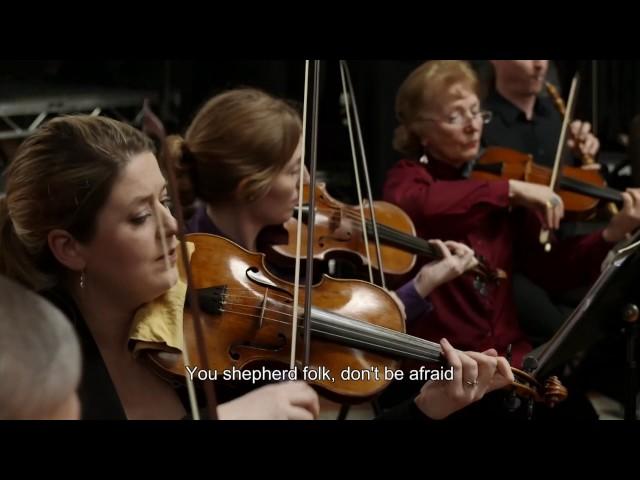Комментарии:

Rick brought me here too. And I’m glad he did!
Ответить
Well done...thank you
Ответить
Just phenomenal ~ thank you Sir Gardiner❣️
A documentary so exquisitely crafted and such a marvellous tribute and justice done musically, intellectually and spiritually about one of the most profound geniuses who lives on in our hearts and souls ~ all due to his timelessness , spirit and human accessibility.

Passion to music brought me here
Ответить
Bach was good but Snoop Dog is better
Ответить
Thank you so much for putting this only, it is magnificent. (and shows what an un-politicized BBC could do in olden times)
The fugue at the end invites comparison to Mozart singing his own requiem (written for someone else, but then it became his own) with friends in his last hours.
This documentary or rather piece of art in itself clarifies an obvious contradiction between severe protestantism and baroque Catholicism: Bach was born in the wrong place. He truly flourished in praise of the Lord when in contact with catholicism in his last years, where I would always have placed him anyway. He lived in the wrong place, too much north. Don´t many of us feel like living in the wrong place or time?
Bach as the ultimate baroque man clearly needs to be understood with a baroque "Lebensgefühl". The incredible hardships of his life, with 9 out of 22 children prematurely deceases, his parents and even his first wife, are chilling. The professional difficulties with employers not understanding his genius forced the true genius, "the diamond created from carbon under pressure", by the limitations to his expression.
This film taught me even more that Bach, like Shakespeare, Aquinas, Heisenberg, is one of those beings normal humans can only wonder at from a modest distance, living in spheres we can only glance at.
Wonderful. Thank you, Sir Gardiner.
Jens Schirner, a Bavarian Catholic and lover of the renaissance and Barock.

Beautiful documentary. Only the tone of relentless genius signaling, especially from the writers, is a bit tiring, as if the viewer is to be sold a second hand car. It is not necessary, the story and the music say enough.
Ответить
I don’t know who Rick Beats is, but given that they referred a lot of people to a documentary on J. S. Bach, it’s a safe bet that they have exquisite taste in music
Ответить
Per quanto ci si possa avvicinare a JSB con lo studio senza risparmio, con la propria empatia verso la sua opera ...la domanda CHI È JSB? è e rimarrà senza risposta per la specie umana
Ответить
Very enjoyable. Although, I thought it was odd that it was emphasized how we don’t have much in the way of letters and “facts” about Bach, and then it characterized him as having “paranoid personality disorder” based on that limited info.
Ответить
this is so fucking boring
Ответить
Thank you so much for posting this.
Ответить
Bach got church congregations to sing along to his music? Let’s try that in comparison to todays church music 💀yea no haha
Ответить
i bow ❤
Ответить
Too much emphasis on Bach's religious works. Bach's non-religious work is truly his best!
Ответить
Thank you thank thank you for making this wonderfully narrated and filmed documentary available! 🙏🏻
Ответить
What, no gloves? When handling a centuries-old document? 😮😊
Ответить
"30 miles away, walking the whole way"
"260 miles away, walking the whole way"
He didn't give a crap, the man had somewhere to go and he just went

Great Bachumentary.
Ответить
It's a shame this isn't available on disc. I'd love to have a blu-ray copy.
Ответить
Not here for the story just here for the music
Ответить
You travel around Germany and you'll kind of randomly run into either "Luther was here" or "Bach was here". Those dudes got AROUND!
Ответить
Although he undoubtedly had a satisfying experience in his lifetime, you kind of wish Bach could hear his music produced now with modern instruments, tuning and engineering.
Ответить
And if Bach were alive today, I'll bet Rick Beato would interview him.....or spend every day trying to anyway 😉
Ответить
That lady in the choir is out of a historical painting.
Cute and cool

I have loved Bach all my adult life, and I had no idea how much Bach suffered during his life. I deeply appreciate this video which has given me a deeper appreciation for how Bach did not let his life of sadness stop his "passionate life". Thanks to this portrayal, I know will appreciate Bach's music all the more. And thank you Rick Beato for recommending this documentary.
Ответить
Pope John Paul said once: If the angels play for themselves they are used to play Mozart….but if they play for god they certainly play BACH…😊
Ответить
Thank you Rick Beato for recommending this fantastic documentary.
Ответить
The presenter wrote a rather comprehensive biography of Bach, on which this seems based. Titled: Music in the Castle of Heaven. Recommended 👍🏼
Ответить
Good documentary. Music performance not so
Ответить
“This Leipzig cantor is the manifestation of God: pure and yet inexplicable.” Carl Friedrich Zelter
Ответить
Highly interesting documentary interspersed with music clips.
Ответить
عالی
بینظیر

There is a fashion nowadays of willing to quantify and measure in scientific terms each thing and person under the sky. We like to unveil mysteries and to lay bare the secrets of people. We relish in unveiling supposed secrets and in being under the spotlight...and we gain notoriety and money doing it. These are not the best conditions to reach a balanced judgement.
This is why I find it a bit risky to draw a psychological portrait of JS Bach in the way it's been done in this documentary, (that starts well researching Bach's early years and then gradually moves on to examine his music forgetting his last years and his family life), given the scarcity of direct proofs at hand, and above all, to come to such a conclusion.
If we remember well, he was thrown into prison twice, once in Weimar and once in Köthen, only for wanting to leave the dukes. I wonder how Gardiner and the psychologist would feel if they were thrown into a dark humid dungeon on bread, cheese and water, (with a family full of children depending on them) each time they wanted to change jobs...
The sudden loss of his wife and his many children, plus his parents in earlier life; the constant struggle to produce creative music surrounded by family and professional constraints imposed by people of inferior intellectual ability; starting life in the back province of Germany, not in Hamburg for example; being considered an artisan in those times, and not an artist... I think that JS Bach must have felt a terribly lonely artist.
Yet this solitude and lack of universal fame during his life time were conditions sine qua non to achieve his musical goals, undistracted by fame and adulation, something that most artists nowadays don't see well.
Other composers of the same age (Graupner, Telemann, Händel, Vivaldi) enjoyed much more favorable and comfortable living conditions and yet did not reach his intellectual and emotional stature, nor did it any of his musician children.
Perhaps one condition of truly great art is the previous suffering of the artist, and of that, he had more than enough. This is why he is such a wonder, being able to produce such body of work under such conditions. This is why I would avoid casting the man into a psychological deviated pattern from the comfortable perspective of a 21st century person: put yourselves in his shoes in that time.
The only blotch I see in his life is that he did not manage to educate his daughters in the same manner he educated his well-known musical sons. It looks to me he had traditional provincial views on women for that age. Also, he put his singer wife Magdalena to produce children and to help him producing music, rather than furthering her career. Still, he managed to educate four top musicians out of his own children, which is much more than any Graupner, Telemann, Händel, Vivaldi, Mozart and Beethoven all together ever did. This alone is another mark of his grandeur as a musician, artist and educator.
He was a musical-enterprise and on him depended the whole family. However, again, those were the times where women could hardly aspire to professional independence away from men. For example, the mother of Giacomo Casanova was one of those rare examples of women-artists that had an independent income in Dresden, as far as I know.

I'm not a hungover middle chool music teacher, but I put this on the tv about as often.
Ответить
Bach stimulates the mind and takes the soul to the presence of God. Who else does that?
Ответить
I love this. And yes, Rick Beato brought me here. Thank's Rick.
Ответить
the music in the background is too awesome, i can't concentrate on what is said
Ответить


























